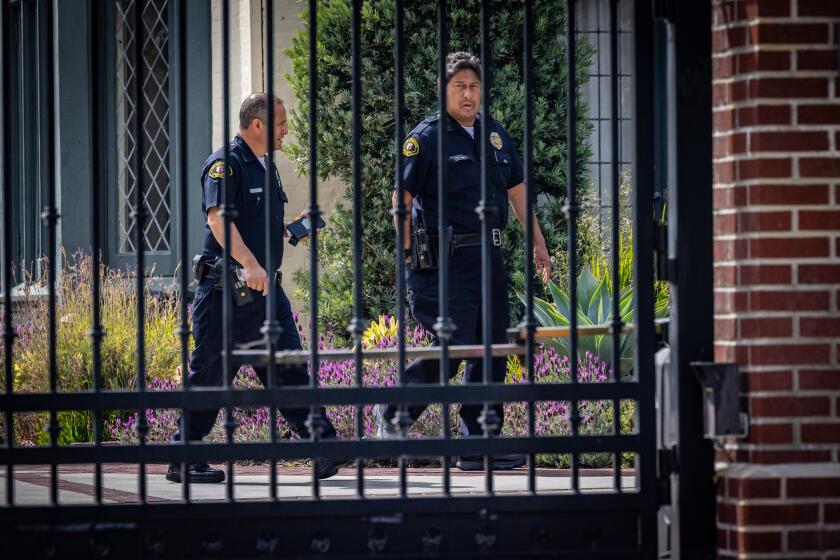Change Plates, or Make Them
In a major crackdown starting today, the California Highway Patrol wants residents statewide to turn in fellow motorists they suspect of illegally driving vehicles with out-of-state license plates.
The public is being asked to jot down license plate numbers and other information and send it anonymously to CHP headquarters via computer. With that, the agency will track down violators.
The effort will also be a moneymaker for California, says the head of the Highway Patrol, Commissioner D.O. “Spike” Helmick. “My guess is that it easily would be close to $10 million” in additional revenue, he said in an interview.
“Two weeks ago, I was in Los Angeles on Interstate 5 and I was absolutely amazed,” he said. “I was about the only California plate out there. They can’t all be tourists going to Disneyland.”
In brief, California laws require residents to register their cars and trucks with the Department of Motor Vehicles within 20 days of establishing residency and getting a job.
At the center of the enforcement effort will be owners who live and work in California, but whose vehicles display out-of-state license plates and are registered in other states where motor vehicle fees are significantly lower, such as Oregon.
Some cheaters, officials say, buy and register their vehicles in another state and list a post office box there instead of their California address. In addition to dodging registration fees, these motorists also escape millions of dollars in sales and use taxes that otherwise would flow into California coffers.
Under the project, the public is being urged to use a CHP website to anonymously report possible violations, www.chp. ca.gov/html/cheaters.html.
From there, a handful of patrol officers and staff, using a nationwide computer system, will begin tracking down registration and driver’s license information and send a demand for overdue California fees.
There are 29.6 million legally registered vehicles in California, but officials say it is impossible to accurately estimate how many others are unregistered.
In California, the average cost of registering a vehicle is $130, including $90 in recently reduced vehicle licensing fees, which are levied in lieu of a property tax; a $9 CHP fee and a one-time license plate fee of $1. Other charges for special district and local programs can also be made for such things as anti-smog campaigns, disposing of abandoned vehicles and theft and anti-alcohol education programs
Vehicle registration is a major source of revenue for local governments, the CHP, Department of Motor Vehicles, Caltrans and other government agencies. In 2003, registration-related fees totaled $4.3 billion, the Department of Motor Vehicles said.
Most motorists pay their fees and expect others to do so, but they can get angry at freeloaders, said Helmick, noting that he receives plenty of e-mail from motorists who turn in their neighbors. He is counting on the notion of reporting cheaters via the Internet to be popular.
“I think it’s the right thing to do. They use our roads and our services for free. It’s an outrage. They ought to pay,” said motorist Craig Brown of Sacramento, a lobbyist.
Failure to register can be costly. For example, if vehicle owners live or work in California but fail to register their cars, they are liable for retroactive payments dating to when they should have registered.
Drivers identified as cheaters will get a letter from the CHP asking them to pay up or “you could be arrested for a misdemeanor violation and, if convicted, could be fined up to $1,000 and serve six months in jail.”
Citing owners for failure to register vehicles is a routine part of police work, but half a dozen officers at the CHP’s South Sacramento office recently showed what an enforcement crackdown could do for the state.
During their lunch hours and before and after work, they homed in on shopping centers, apartment complexes and faculty parking lots at colleges, prowling places where an out-of-state license plate might indicate that the owner was a local resident.
The officers said they paid special attention to luxury sedans and expensive pickups.
So far, the quiet campaign has resulted in the recovery of an estimated $574,000, said Officer David Costantini, a member of the original group.
Soon, other officers joined in. Trolling shopping center parking lots looking for cars with out-of-state license plates has become competitive even among top CHP executives and civilian employees.
“Everybody got excited about it. Even the secretaries are writing down plates,” said Helmick, who said he typically sees three or four suspicious plates during his morning commute and jots them down.
Costantini said the notion of catching registration deadbeats has become a family affair in his household on trips with his wife and two young daughters scanning traffic and writing down license plate numbers for him to process at work.
The CHP keeps score. For the first three months of the year, a tally sheet reported that the sightings by one champion officer produced $28,166 in revenue from 124 cars; his closest rival finished at $27,979.
Anecdotal evidence suggests that Oregon is a favorite choice for Californians to buy and illegally register their vehicles, Helmick said, including motor homes that can cost $100,000 or more.
Oregon discourages business from Californians, going so far a couple of years ago as to display posters that said, “If you’re not from Oregon, you just don’t get it.” Funds for the project came from a very heavy fine paid by a Washington couple who had illegally registered their vehicle in Oregon.
Costantini said most motorists respond to letters for payment, which are shared with the DMV. Most do not contest the issue, although some parents of out-of-state college students are stunned when they receive a demand for payment of registration fees on the family car. If students are paying nonresident tuition fees, they typically are not cited because they are not considered residents. But when they begin paying lower California resident tuition charges, they lose their immunity.
Costantini said the most common excuse he hears from the cheaters is that they didn’t know they had only 20 days after establishing residence to register their vehicles. The next most common excuse is they believed that they could run out the unexpired term of their home state license plate before having to register in California.
Scott MacGregor, an assistant CHP chief who can spot a out-of-state plate from at least a block away, said the cheaters never know when they’ll be turned in and by whom.
One of his favorite stories, MacGregor said, involved a customer in a restaurant overheard “bragging that he’s got Nevada plates but lived here for 10 years and got away with it.” Big mistake. Next thing the braggart knew, he was facing a huge bill for payment of back registration fees.
*
(BEGIN TEXT OF INFOBOX)
Vehicle registration
Here is a random sample of estimated automobile registration fees on 2004 vehicles in Los Angeles County; in Clark County, Nev., and in Oregon and Arizona:
Honda Accord DX (Retail price: $17,190) Oregon $108 L.A. County $166 Arizona $299 Clark County, Nev. $334
Toyota Sienna ($23,945) Oregon $108 L.A. County $208 Arizona $408 Clark County, Nev. $444
Lincoln Navigator ($53,220) Oregon $108 L.A. County $401 Arizona $902 Clark County, Nev. $964
Gulfstream Sun Voyager RV, 32 feet long ($99,500) Oregon $291 L.A. County $702 Arizona $1,685 Clark County, Nev. $1,768
Registration rules
Many newcomers to California are unaware of the state’s vehicle registration requirements. Generally, one must register a vehicle upon becoming a resident. The Vehicle Code defines a vehicle owner as a California resident if any one of several conditions are met, including:
* Is registered to vote in California. * Is employed or owns a business located in the state. * Pays resident tuition at a public college or university. * Files a homeowner’s property tax exemption. * Rents or leases a home as a residence in the state. * Possesses a California driver’s license. * Participates in other “acts, occurrences or events” that indicate a motorist’s presence in the state is more than “temporary or transient.”
Sources: CHP and Vehicle Code
More to Read
Start your day right
Sign up for Essential California for news, features and recommendations from the L.A. Times and beyond in your inbox six days a week.
You may occasionally receive promotional content from the Los Angeles Times.






